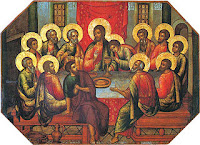When the offer of reaffirmation came to me, I thought I would participate in the event but didn’t know what to expect. I don’t remember how I felt during confirmation, only the amount of study it required. Unfortunately, with a toddler in the house, I was unable to take part in the classes offered by St. Barnabas. However, fortunately, Mother Linda and Father Charles still allowed me to be reaffirmed on that Sunday morning.
All of a sudden, it seemed, the three day weekend was upon us. Allen suggested we get away for the weekend and I said, “Great! Let’s do it, but I will need to tell St. Barnabas I won’t be participating in the service.” Since I didn’t take part in the classes, I figured it would not be a big deal. But Allen said, “Oh no, you must be reaffirmed by the Bishop on Sunday. This is very important.” So our mini-vacation turned into a “staycation.”
I showed up at church that Sunday morning and was shuffled into Mother Linda’s office to hear from the Bishop. His was a quick yet profound speech. He asked us to think about how we will use this experience in the coming year: What will we do to live a more Godly life? Even if we don’t have a plan of action that morning, he asked us to pray for guidance. His words cut me deeply. Included in my New Year’s resolutions was to become more involved with my church and our community, and to better understand what it means to take God first.
I often hear that we should keep God center and live a Godly life, but what does that really mean? How do I take God first? I saw on my brother’s wrist this past weekend, a bracelet that says “I am second.” I asked him what it meant, and he said it reminds him to take God and family first. He admitted that he is not always good at taking God and others before himself. I told him about one of St. Barnabas’ parishioners who asked somewhat jokingly, “What would Jesus Tweet?” Perhaps I need to put those words on my wrist.
I am still uncertain exactly how to live a Godly life. Does this mean I need to place less value on material goods? Simply (or not so simply) follow the Ten Commandants? Tithe? Become more active in my church and its missions? To start, I will try to remember daily that God should be center in my life and in my family’s life. I will thank Him for my blessings and not just call upon Him when I have a challenge. I will listen for and attempt to truly hear His word and how I am meant to spread His word. As a friend once told me, “be quiet” and listen. I will ask God for guidance and listen for His answer. I will consider what I am doing now and what I can do better to keep God center in my life. I will consistently remind myself that I am second.
Jennifer White Gradnigo




